Clans: Per The Books
The life of the Wagon Peoples is one of raiding and warfare foremost and Clan relationships second:
“They do not have castes, as Goreans tend to think of them. For example, every male of the Wagon Peoples is expected to be a warrior, to be able to ride, to be able to hunt, to care for the bosk, and so on. When I speak of the Year Keepers and Singers it must be understood that these are not, for the Wagon Peoples, castes, but more like roles, subsidiary to their main functions, which are those of the war, herding and the hunt. They do have, however, certain clans, not castes, which specialize in certain matters, for example the clan of healers, leather workers, salt hunters, and so on. I have already mentioned the clan of torturers. The members of these clans, however, like the Year Keepers and Singers, are all expected, first and foremost, to be, as it is said, of the wagons namely to follow, tend and protect the bosk, to be superb in the saddle, and to be skilled with the weapons of both the hunt and war.”—Nomads, 12
Below are quotes pertaining to the Clans specifically noted in John Norman's Nomads of Gor. This page is intended to be a resource for Maze Tuchuk Camp free persons who have not yet chosen a Clan or those who wish to learn more about their chosen profession.
Haruspexes: This clan is responsible for telling the future in various signs of nature, for reading omens in the livers of bosk, verr, tarsk, and kaiila during the Omen Year, and for providing camp free women with a religious outlet. Armed with a variety of magic spell-papers and trinkets, Haruspexes are somewhere between a Tribal Shaman and a Gypsy fortune teller. Only men are allowed to pray; thus it is that all Haruspexes are male.
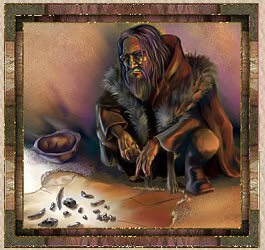
“I heard a haruspex singing between the wagons; for a piece of meat he would read the wind and the grass; for a cup of wine the stars and the flight of birds; for a fat-bellied dinner the liver of a sleen or slave.”—Nomads, 27
“… the haruspexes, who, besides foretelling the future with a greater or lesser degree of accuracy for generally reasonable fees, provide an incredible assemblage of amulets, talismans, trinkets, philters, potions, spell papers, wonder-working sleen teeth, marvelous powdered kailiauk horns, and colored, magic strings that, depending on the purpose, may be knotted in various ways and worn about the neck.”—Nomads, 28
Healers: Absolutely no information is given concerning the medicinal practices of the Clan of Healers. In fact, this Clan is only mentioned in passing in a single quote which is, itself, a footnote:
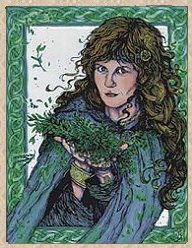
“They do have, however, certain clans, not castes, which specialize in certain matters, for example the clan of healers…”--Nomads, 12
One may assume, however, that the healing provided by this Clan is rather rudimentary in nature given the fact that Kutaituchik received his medical treatment from a Physician of the Cities:
"When Kamchak had finished he held out his right hand and a man, not a Tuchuk, who wore the green robes of the Caste of Physicians, thrust in his hand a goblet of bosk horn; it contained some yellow fluid. Angrily, not concealing his distaste, Kutaituchik drained the goblet and hurled it from him."--Nomads, 44
We do see one further mention of healing services rendered, this time during the raid of the Paravaci. Again, this medical treatment is not given by the Clan of Healers:
“Free women, and even some Turian slave girls, went to and fro, bringing water, and, here and there, where there was point in it, binding wounds"--Nomads, 263
Where are the Healers? Are Tuchuk Healers perhaps all men, and being Warriors first and Clansmen second, otherwise engaged on the battlefield? Or were the circumstances so dire that Healers simply had no time to practice their craft? We are not told. We do know, however, that there were women Physicians in the Cities; thus, for the purposes of our camp, both male and female Healers are permitted. To learn more about medicinal practicies in Maze Tuchuk Camp, please visit the Healers Clan webpage.
Iron Masters: This clan is responsible for the branding and piercing of slaves and may also be called upon to ring the noses of free women.
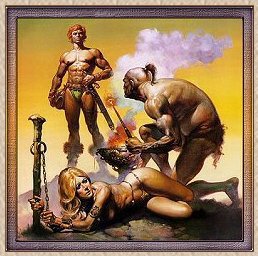
"I supposed that on the morrow Kamchak would call for the Tuchuk Iron Master, to brand what he called his little barbarian."--Nomads, 62
"Kamchak stopped by an Iron Master's wagon, and, to my irritation, arranged for the fellow to come by the wagon that very night."--Nomads, 170
"On the way we passed a girl, a girl from Cos taken hundreds of pasangs away in a raid on a caravan bound for Ar. She had been bound across a wagon wheel lying on the ground, her body over its hub. Her clothing had been removed. Fresh and clean on her burned thigh was the brand of the four bosk horns. She was weeping. The Iron Master affixed the Turian collar. He bent to his tools, taking up a tiny, open ring, a heated metal awl, a pair of pliers. I turned away. I heard her scream."---Nomads, 173
Although Nomads tells us that Iron Masters saw to the affixing of nose rings, we do see that those of the Caste of Leather Workers performed these duties in the cities. The following quotes provide some insight into the methods used for the piercing of ears and noses. Tuchuks of the books regard the piercing of ears as a barbaric, horrifying custom, but MTC contains members of diverse backgrounds who may find pierced ears attractive on their female slaves.
“Many men apparently find pierced ears on a girl extremely provocative. Craftsmen of the metal workers, men specializing in the working of gold and silver, were concerned to work out new forms of jewelry for female slaves.”—Captive of Gor, 167
“I knelt on the low wooden platform, while one of the leather workers, with a long needle, approached my face.
“No anesthetic was used, for I was a slave, but it was not particularly painful…
“The leather worker stood up.
“My ears had been pierced…
“The leather worker wiped away the bit of blood, with a cloth.
“He then fixed two tiny steel rods, with threaded ends, through the wounds. To each end of the rods he threaded a tiny steel disk, that the tiny rods might be held in the wounds. The disks and rods would be removed in four days.”—Captive of Gor, 157
“In his hand he held something which looked like a pair of pliers, except the claws were extremely slender, and bent in such a way as to touch one another, at the tips scarcely more than a needle’s width…I felt the back of the claws of the punch enter my nostrils, distending them. There was a tiny, sharp click. I felt acute pain for an instant, then a prolonged, burning, stinging sensation…
“When I opened my eyes, blinded with tears, I saw the leather worker approaching my face with a tiny, steel ring, partly opened, and a pair of pliers.
“As I was held he inserted the ring in my nose. It was painful. Then, with the pliers, he closed the ring, and turned it, so that its opening, where the closed edges met, was concealed within, at the side of the septum.”—Captive of Gor, 165
Leather Workers: This clan is mentioned specifically in only a single quote. Given our simple, barbaric life upon the plains, one may assume that Tuchuks would use much the same methods of tanning leather as were seen in Medieval Europe and the American Old West. Members seeking this profession should be well-versed in such information. A leather worker would never lack for work; we know that Tuchuks wore leather clothing and boots, used leather weapon sheaths, and covered the domes of their wagons in boskhide. Leather workers will also be responsible for curing the hides and pelts which provide us with bedding and winter clothing. Just as one Musician might play a different instrument than another, we naturally assume that there would be sub-classes of this Clan, such as Cobblers, Saddle Makers, Furriers, and so on.
"He did not buy a kaiila near the wagon of Yachi of the Leather Workers..." --Nomads, 170
“Although the dais was resplendent, and the rugs upon it even more resplendent, I saw that beneath Kutaituchik, over these rugs, had been spread the simple, worn, tattered robe of gray boskhide.”—Nomads, 43
“I turned to see a stout man-at-arms step to the dais, carrying in his arms, folded in the furs of the scarlet larl, a girl.”—Nomads, 44
“For clothing he permitted her to cut and sew, as well as she could, a sleeveless garment from the pelt of the red larl.”—Nomads, 64
“At one point, he wrapped a heavy fur and a leather robe about his left arm…”—Nomads, 170
“I searched among the wagons long before I found [him], sitting cross-legged beneath a wagon, wrapped in a worn bosk robe…”—Nomads, 185
Musicians and their instruments: A full complement of musicians consists of, in order of importance: one czehar player, three flutists, two kalika players, two kaska players, and a man with miscellaneous instruments. Though many of the instruments themselves are simple in nature, Gorean music is meant to be rousing, barbaric, complex, and ever-changing. One who wishes to undertake a musical profession will find it necessary to describe the playing of various NPC musicians until a full compliment of active role-players can be assembled. This clan holds a vital role in the color and vibrancy of Tuchuk life; on any night, a slave dancing to wild melodies, a Singer recounting the old tales, or a group playing for the love of their music might be seen. Further, every slave of Maze Tuchuk is expected to be able to dance on command at any time, for any reason; musicians need not wait for a special occasion to practice their talents.
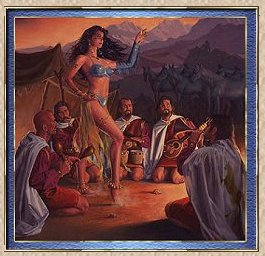
"To one side, across a clearing from the fire, a bit in the background, was a group of nine musicians. They were not as yet playing, though one of them was absently tapping a rhythm on a small hand drum, the kaska; two others, with stringed instruments, were tuning them, putting their ears to the instruments. One of the instruments was an eight-stringed czehar, rather like a large flat oblong box; it is held across the lap when sitting cross-legged and is played with a horn pick; the other was the kalika, a six-stringed instrument; it, like the czehar, is flat bridged and its strings are adjusted by means of small wooden cranks; on the other hand, it less resembles a low, flat box and suggests affinities to the banjo or guitar, though the sound box is hemispheric and the neck is rather long; it, too, of course, like the czehar, is plucked; I have never seen a bowed instrument on Gor; also, I might mention, I have never seen on Gor any written music; I do not know if a notion exists; melodies are passed on from father to son, from musician to apprentice. There was another kalika player, as well, but he was sitting there holding his instrument, watching the slave girls in the audience. The three flutists were polishing their instruments and talking together...There was also a second drummer, also with a kaska, and another fellow, a younger one, who sat very seriously before what appeared to me to be a pile of objects; among them was a notched stick, played by sliding a polished tem-wood stick along its notched surface; cymbals of various sorts; what was obviously a tambourine; and several other instruments of a percussion variety, bits of metal on wires, gourds filled with pebbles, slave bells mounted on hand rings, and such. These various things, from time to time, would be used not only by himself but by others in the group, probably the second kaska player and the third flutist...
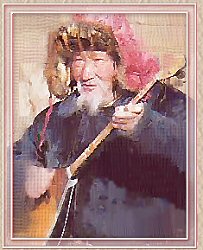
...Among Gorean musicians, incidentally, czehar players have the most prestige; there was only one in this group, I noted, and he was their leader; next follow the flutists and then the players of the kalika; the players of the drum come next; and the farthest fellow down the list is the man who keeps the bag of miscellaneous instruments, playing them and parceling them out to others as needed."--Nomads, 153-154
Peddlers: This wagon camp equivalent of the Merchants is always ready and willing to drive a bargain—Tuchuk style! You may lose half you own in the procuring of a simple bauble, but you’ll be the most entertained pauper on all of Gor. This is a realistic and active camp, its clans buying, selling, and trading amongst themselves to ensure a lucrative living among our mostly self-sufficient People. The Peddler is the center of that system.
"At another wagon, he haggled over a set of quiva, forged in Ar, and, obtaining his price, arranged to have them, with a new saddle, brought to his wagon on the morrow."--Nomads, 170
“Before leaving the wagons I had joined them briefly on their march, long enough to obtain my peddler's disguise and the pound or so of stones which was to complete it. I purchased these things from the man from whom Kamchak had, on a happier occasion, obtained a new saddle and set of quivas. I had seen many things in the man's wagon and I had gathered, correctly it seems, that he himself was a peddler of sorts."---Nomads, 234
Public Slave Wagon Masters: This clan, reminiscent of both city slavers and tavern keepers, is unique on all Gor. Since all un-collared slaves entering MTC will be placed in a camp collar, Slave Wagon Masters will need to purchase or capture their stock elsewhere. Public Slave Wagon merchandise will still be trained according to the basic rules of Maze Tuchuk, but their role-play will have the added dynamic of always being on display for potential buyers. The piteous phrases “Buy me, Master!” and “Buy me, Mistress!” will come often to such a slave’s lips even while serving Paga or dancing to entice such sales.
“Among the wagons...the masters of the public slave wagons...buy, sell, and rent girls, providing warriors and slavers with a sort of clearing house and market for their feminine merchandise. The public slave wagons, incidentally, also provide Paga. They are a kind of combination Paga tavern and slave market. I know of nothing else precisely like them on Gor."--Nomads, 118
"Already a large, curtained enclosure had been set up near the slave wagon. For a fee, the proprietor of the wagon would permit visitors. These arrangements irritated me somewhat, for customarily, the chain dance, the whip dance, the love dance of the newly collared slave girl, the brand dance, and so on, are performed openly by firelight in the evening, for the delight of any who care to watch....I gathered that the little wench from Port Kar must be superb."--Nomads, 147
Salt Hunters: This clan looks for deposits of salt that can be used to season our camp’s food and provide electrolytes for its beasts. Studies of prehistoric and pre-technological societies have revealed that salt is as important for day-to-day survival and prevention of dehydration as water. Indeed, over-hydrated, electrolyte-deficient marathon runners have been known to die due to a lack of salinity in their blood. That said, the importance of this clan to the survival of our People becomes clear. Although little is mentioned of this role, one assumes a Salt Hunter would have to range far and wide to find the precious deposits. Once the mineral is found, it must be brought back to camp in barrels or cut blocks, depending on the type of deposit. One may also assume that this task would not be undertaken by women due to the many dangers found on the Southern Plains. MTC members whose real life circumstances keep them offline for long periods of time might wish to consider this clan as a means of explaining absences in realistic role-play terms!
“They do have, however, certain clans, not castes, which specialize in certain matters, for example the clan of healers, leather workers, salt hunters, and so on.”—Nomads, 12
Scarers: Found only among the four tribes of the Wagon Peoples, the only societies to make use of colorful facial scars to indicate their status and martial prowess, the clan of scarers holds an important role. Although the existence of the clan is mentioned but once, their scarring practices and the significance of the scars are described at length in our Culture and Customs section. To learn more about Scarring practicies in Maze Tuchuk Camp, please visit the Scarrer Clan webpage.
“’When I have the time,’ said Harold, ‘I will call one from the clan of Scarers and have the scar affixed. It will make me look even more handsome.’”—Nomads, 274
Singers: Not trusting important matters to the fallacies of paper and parchment, the Wagon People have a large and complex oral literature. As a result, few among the wagons can read and write. Songs and tales, myths and history are kept by and occasionally, in parts, recited by Camp Singers. Singers have a valued role among the Wagons. These nomadic skalds celebrate historic battles by singing honestly of victories and defeats, but they are also expected to sing of living -- of love and joy, and of lonliness and death-- not merely of arms and glory.
“The Wagon Peoples, as might be expected, have a large and complex oral literature. This is kept and occasionally, in parts, recited by the Camp Singers. “—Nomads, 12
“…where they nourished old grievances and sang the glories of vengeance raids…”—Nomads, 12
“Once, long ago, Ko-ro-ba and Ar had turned the invasion of the united Wagon Peoples from the north, and the memories of these things, stinging still in the honest songs of the camp skalds, would rankle in the craws of such fierce, proud people.”—Nomads, 18
Torturers: No one knows the identities of these mysterious hooded men. As we discover at the end of Nomads of Gor, even a Ubar of one of the Wagon Peoples may be a Torturer who hires his services to those of the cities or who doles out his fearful work in the dark of the night. One of this clan, though extensively trained, would literally live a dual life; he would, in effect, have a “day job” which would occupy most of his time. To be as realistic as possible in Maze Tuchuk, all Torturers will take on TRC characters — unknown, virtually unseen, appearing from the shadows to perform their services and vanishing as mysteriously as they came.
“The Wagon Peoples, of all those on Gor, that I know, are the only ones that have a Clan of Torturers, trained as carefully as scribes or physicians, in the arts of detaining life.
"Some of these men have achieved fortune and fame in various Gorean cities, for their services to Initiates and Ubars, and others with an interest in the arts of detection and persuasion. For some reason they have all worn hoods. It is said they remove the hood only when the sentence is death, so that it is only condemned men who have seen whatever it is that lies beneath the hood.”—Nomads, 9-10
“I feared that Tuka would not run well, thus losing us the match, that she would deliberately allow herself to be easily snared. But then I realized that this was not true.
“If Kamchak and her master were not convinced that she had run as well as she might, it would not go easily with her. She would have contributed to the victory of a Kassar over a Tuchuk. That night, one of the hooded members of the Clan of Torturers would have come to her wagon and fetched her away, never to be seen again. She would run well, hating Elizabeth or not. She would be running for her life.”—Nomads, 69
"‘I have a knife!’ cried Aphris in fury.
“...When Kamchak had drunk the cup of wine he looked again at Aphris.' For what you have done,' he said, 'it is common to call one of the Clan of Torturers.' "--Nomads, 142
"I noted, following me, as I had more than once, a masked figure, one wearing the hood of the Clan of Torturers."--Nomads, 147
“Aphris, for her part, although the quivas were still available, seemed, shortly after having begun to sleep at Kamchak's feet, for some reason to have thought better of burying one in his heart. It would not have been wise, of course, for even if she were successful, her consequent hideous death at the hands of the Clan of Torturers would probably, all things considered, have made her act something of a bad bargain."--Nomads, 155
Year Keepers: This clan works hand-in-hand with the Camp Singers to preserve the living oral history of the Tuchuks. Year Keepers retain an outline of camp history and familial relations while Singers store and recount the details of such things.
“The years, incidentally, are not numbered by the Wagon Peoples, but given names, toward the end, based on something or other which has occurred to distinguish the year. The year names are kept in living memory by Year Keepers, some of whom can recall the names of several thousand consecutive years. The Wagon peoples do not trust important matters, such as year names, to paper or parchment, subject to theft, insect and rodent damage, deterioration, etc. Most of those of the Wagon Peoples have excellent memories, trained from birth.”—Nomads, 12
“His parents and people had been slain in the Turian raid in which he had been captured, so he had no kin. There had been, fortunately for him, a Year Keeper who had recalled the family.”-- Nomads, 68
General Info
. .
Men. .
Men. .
Women
. .
Women
. .
Slaves. .
Slaves. .
Visitors .
Visitors
|
|
|
|